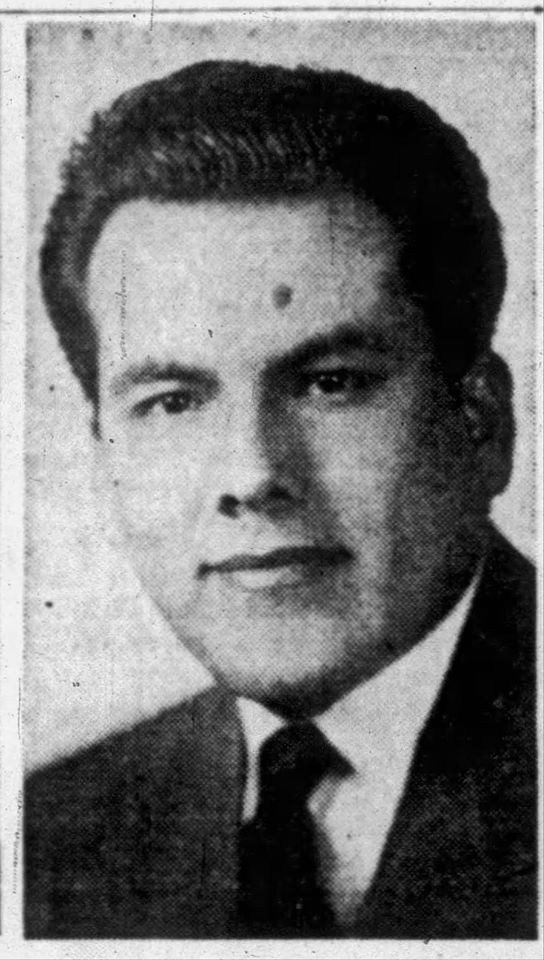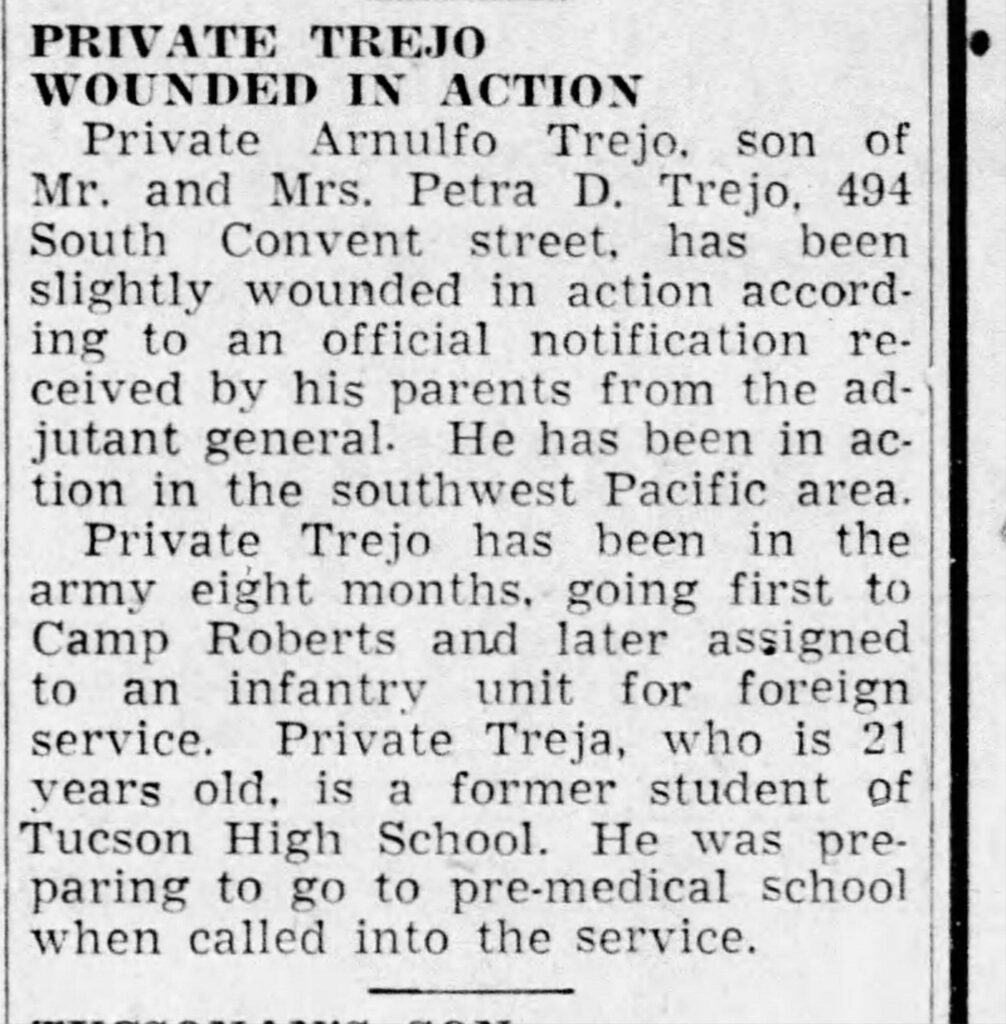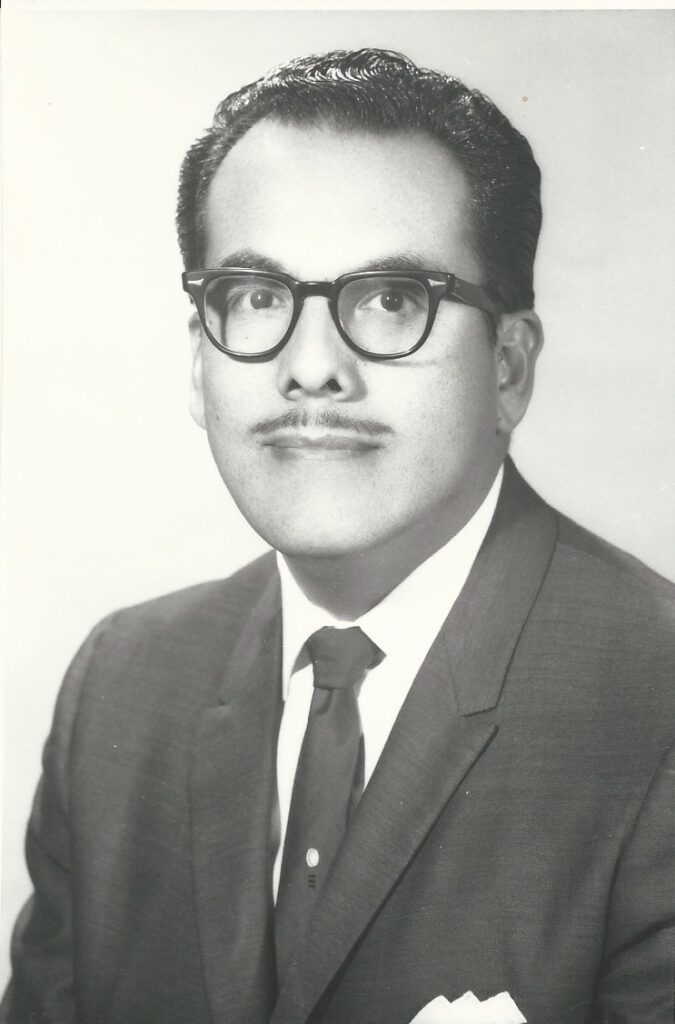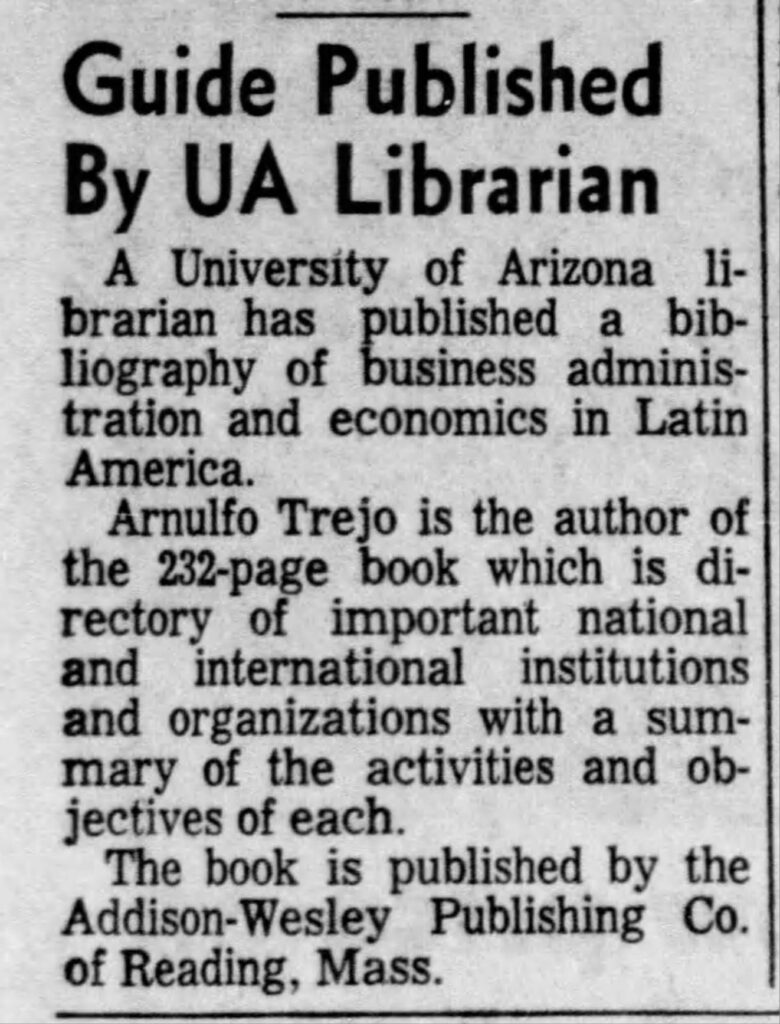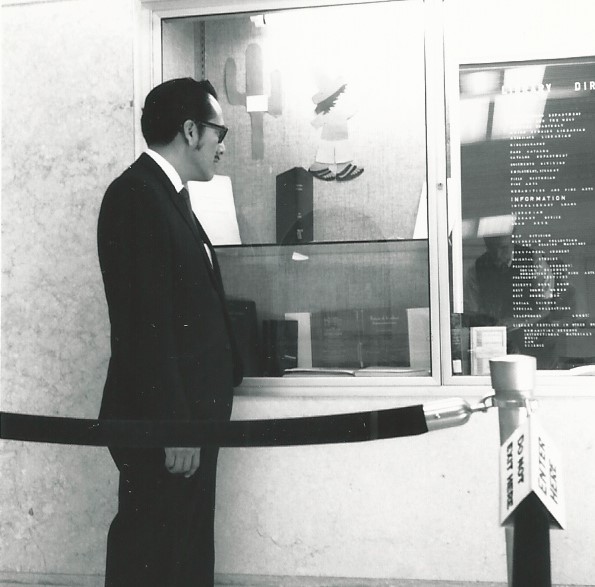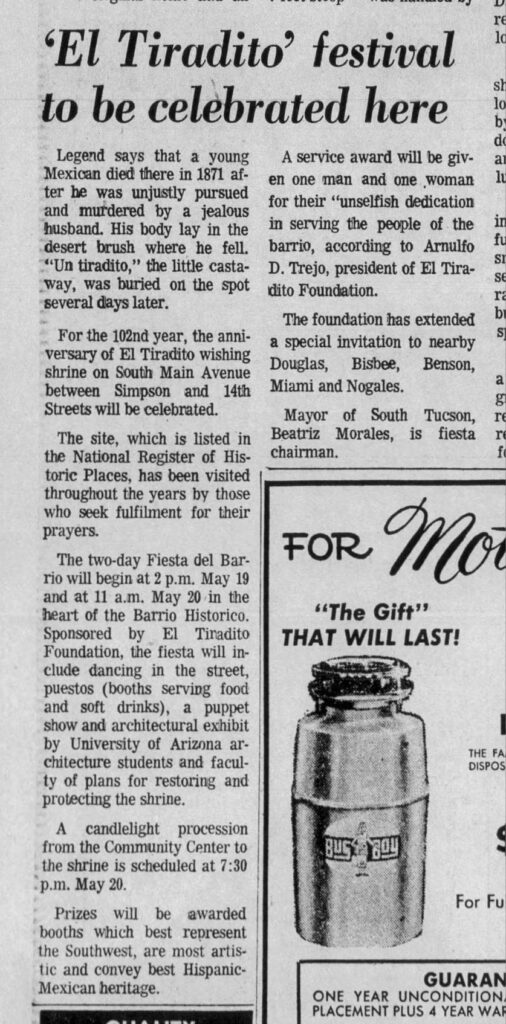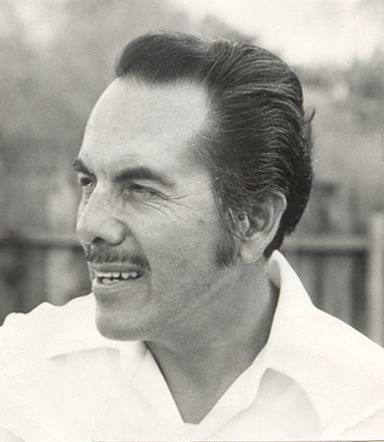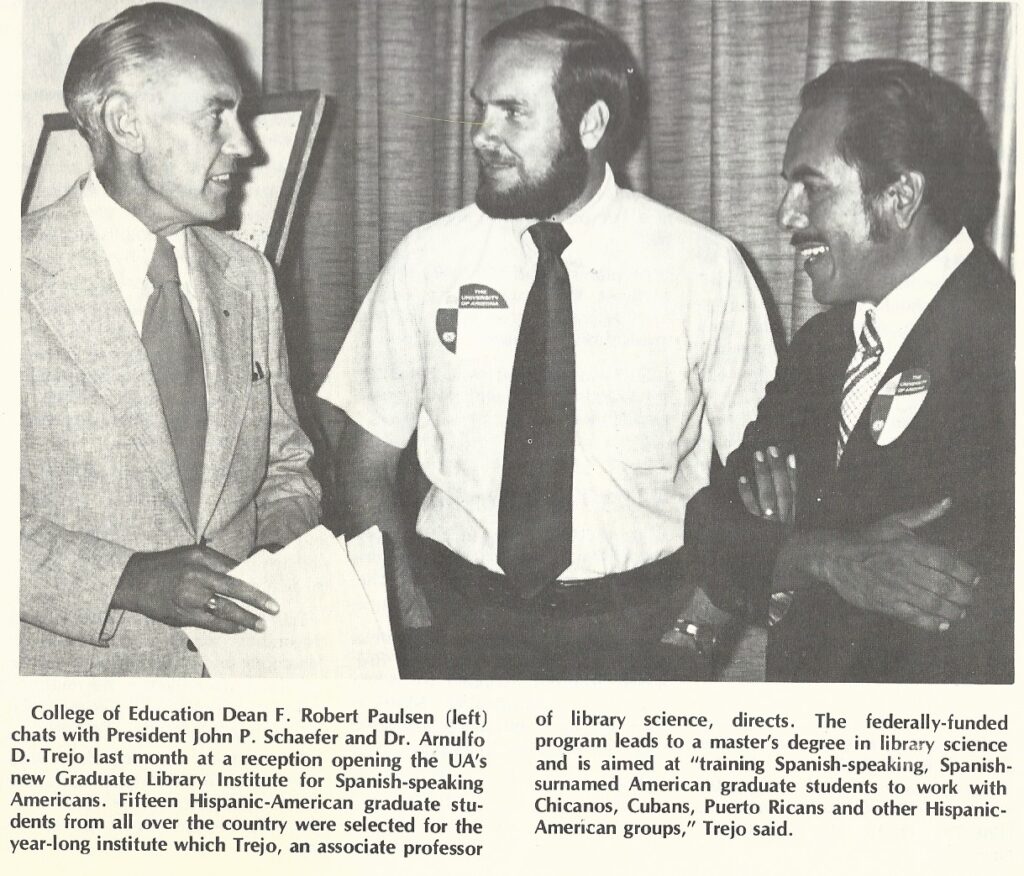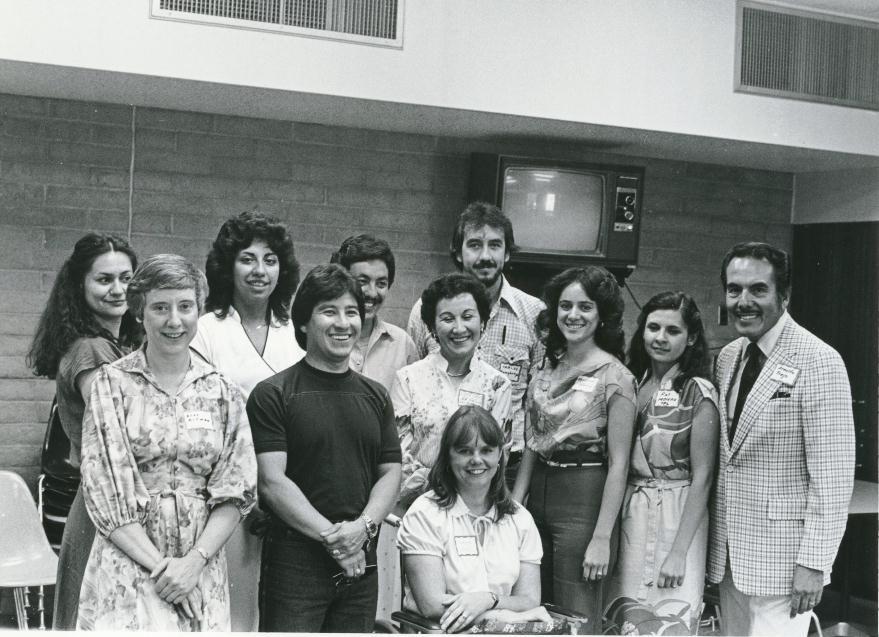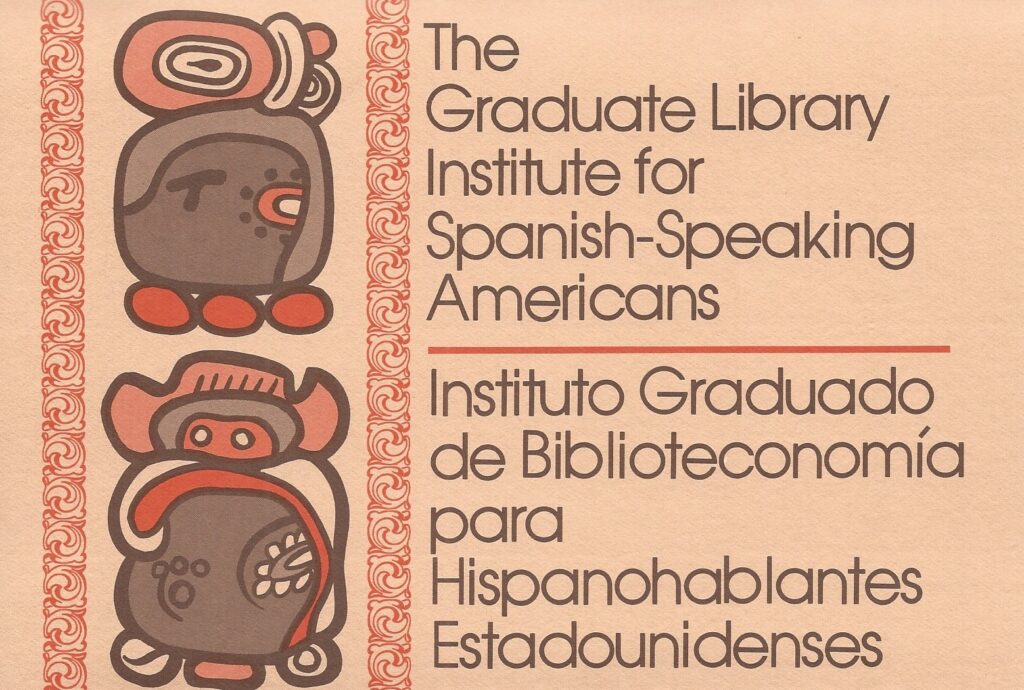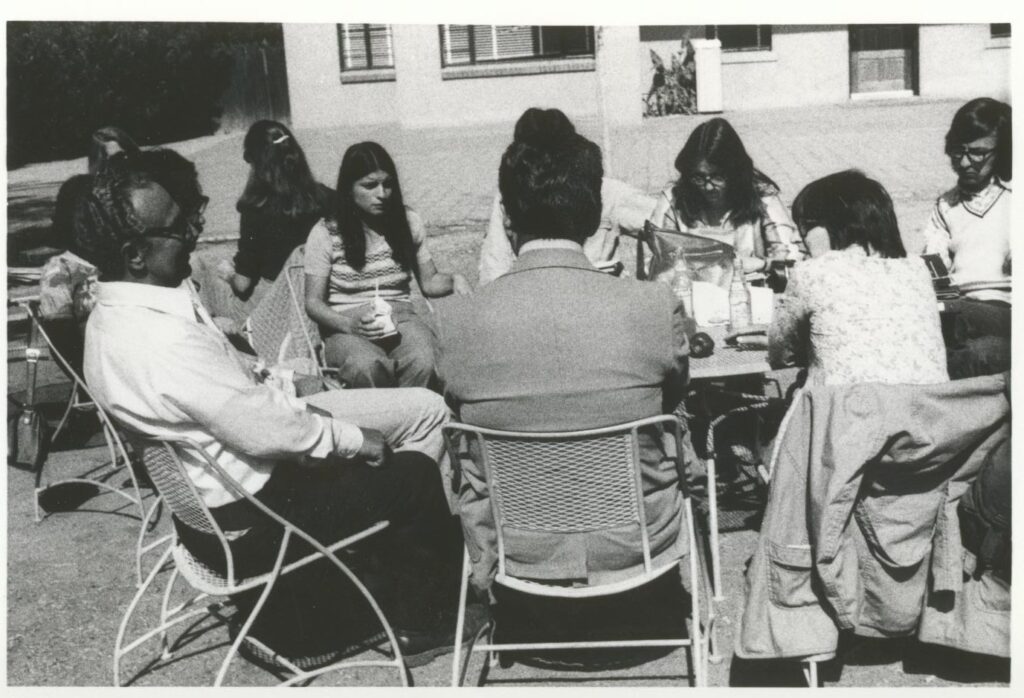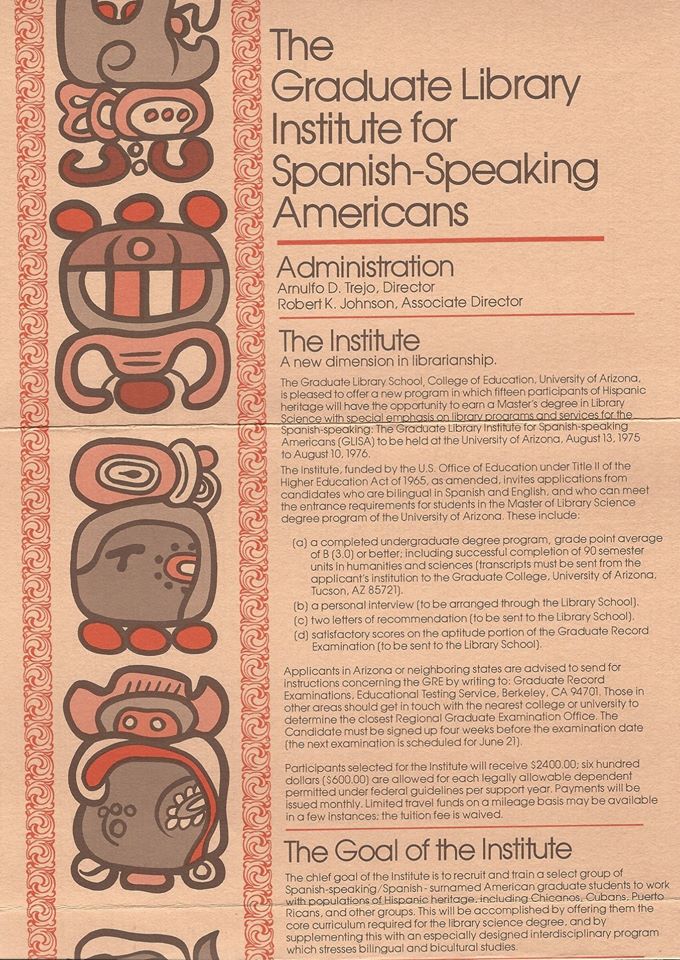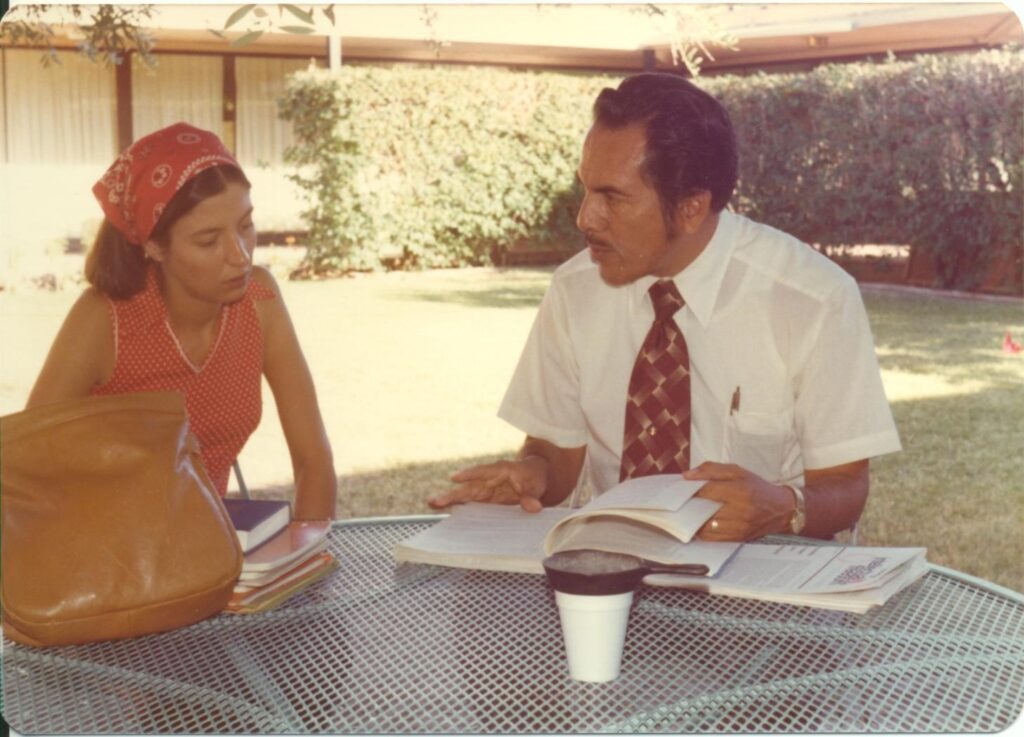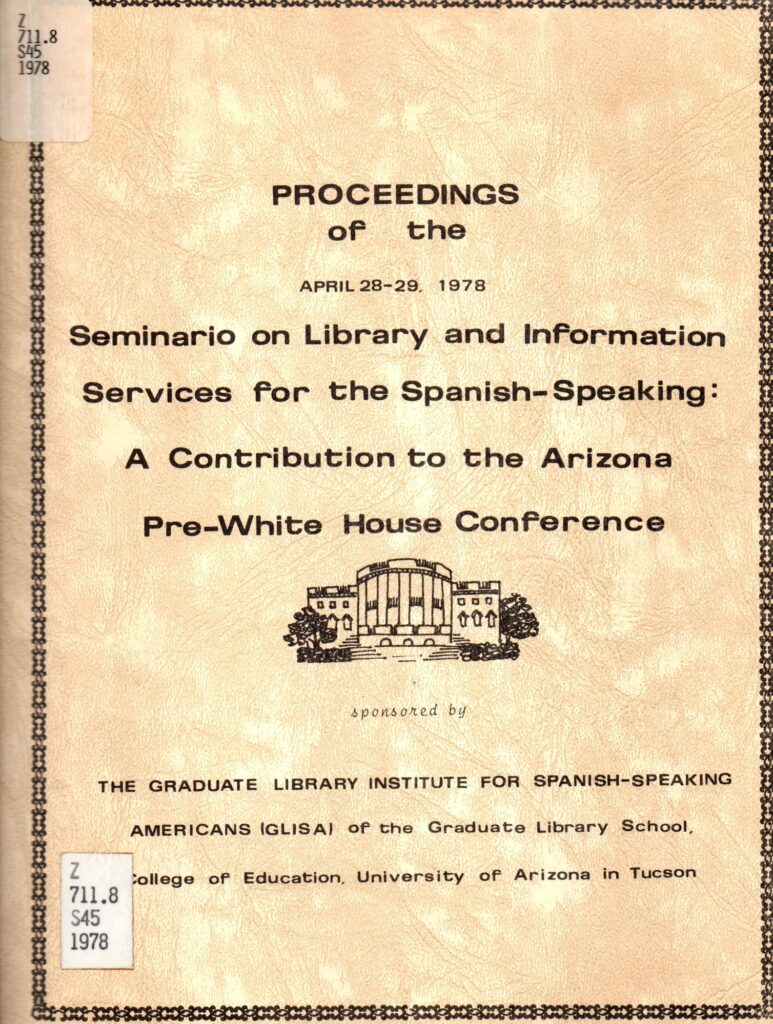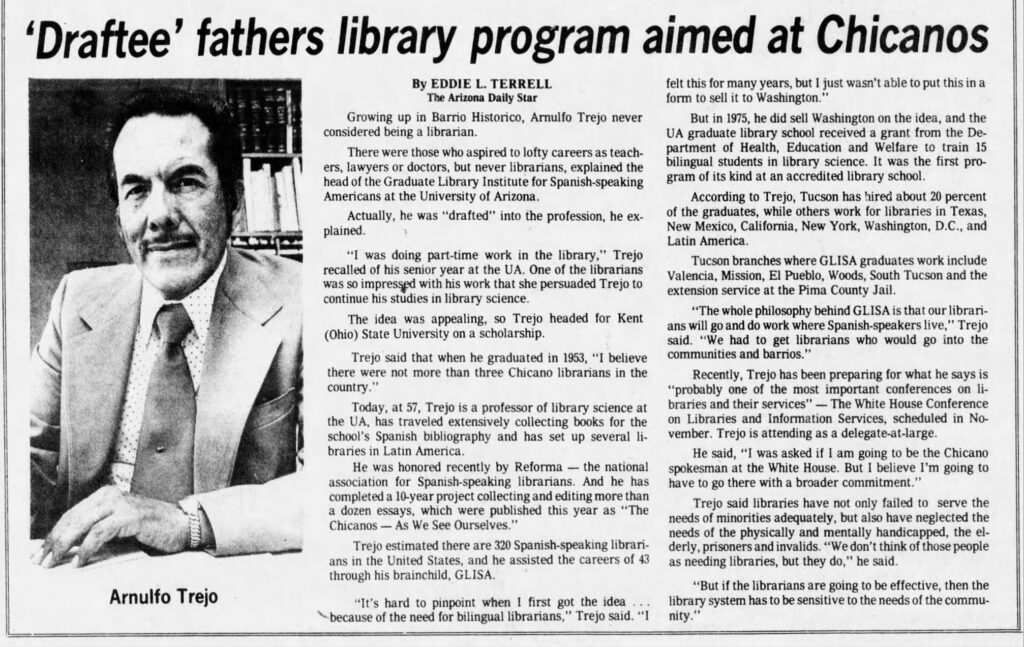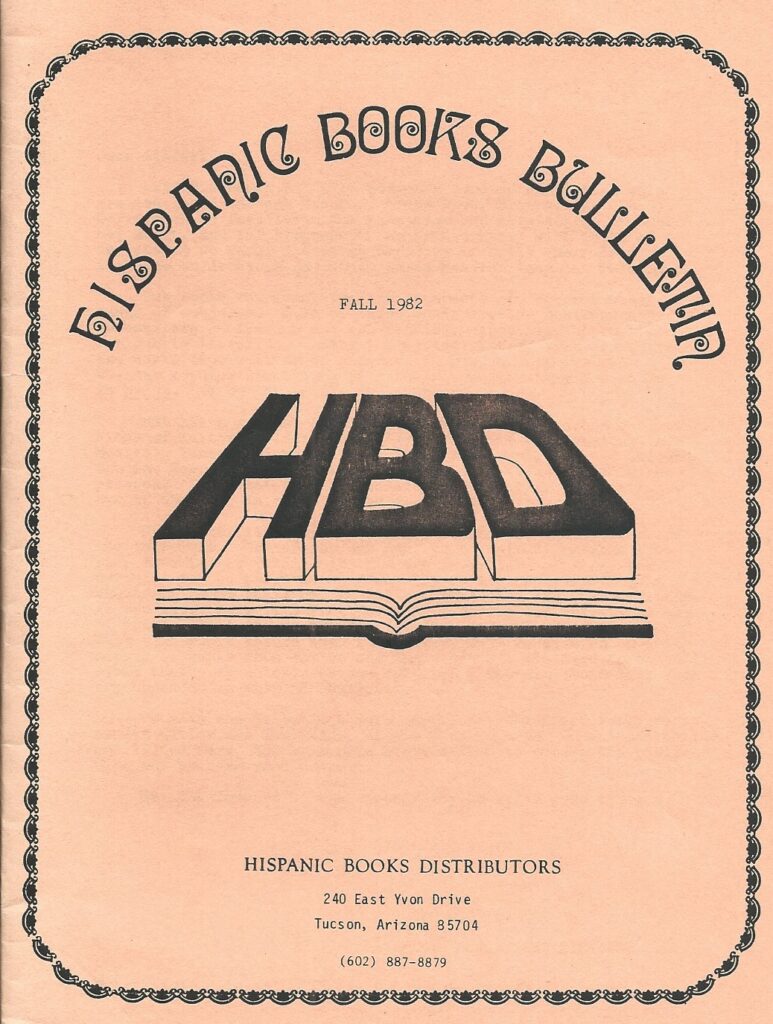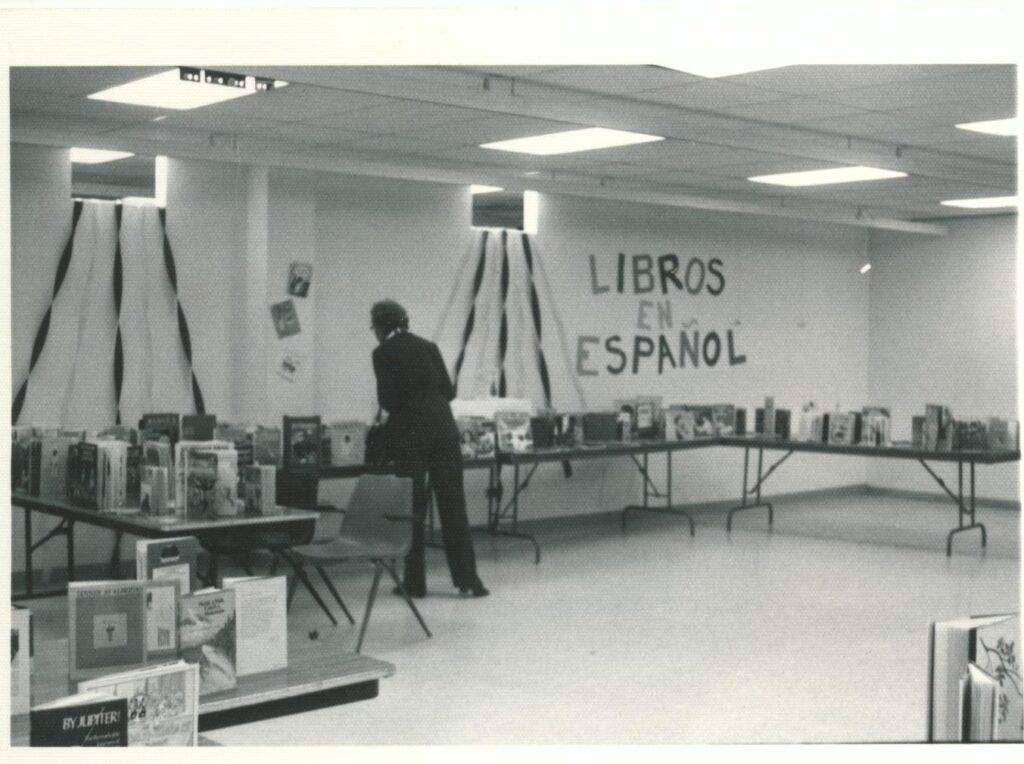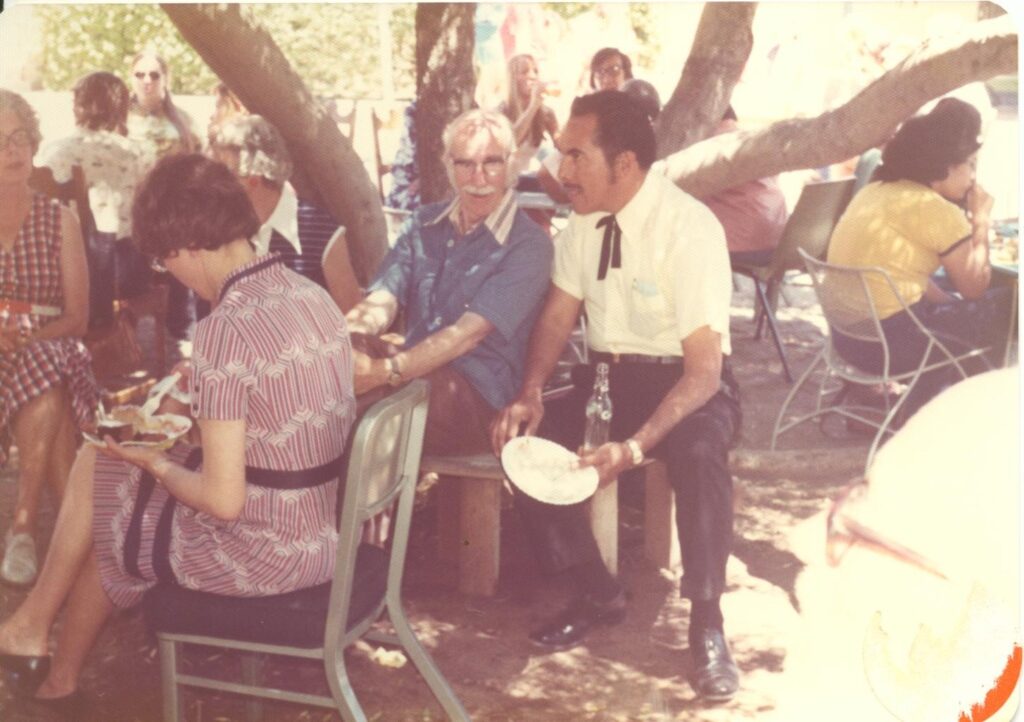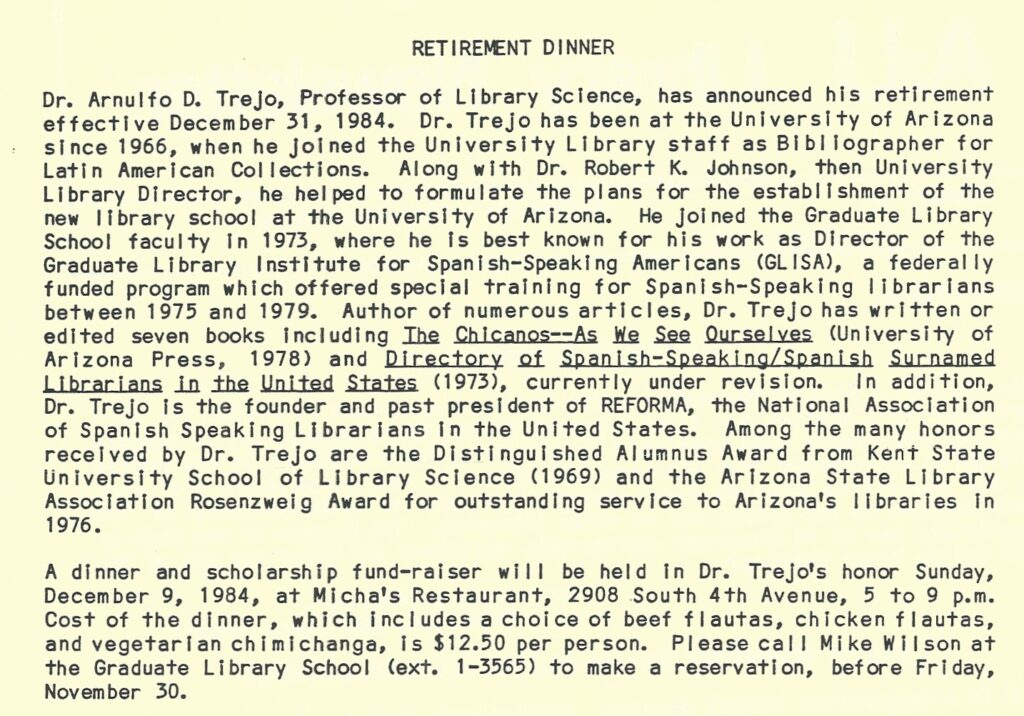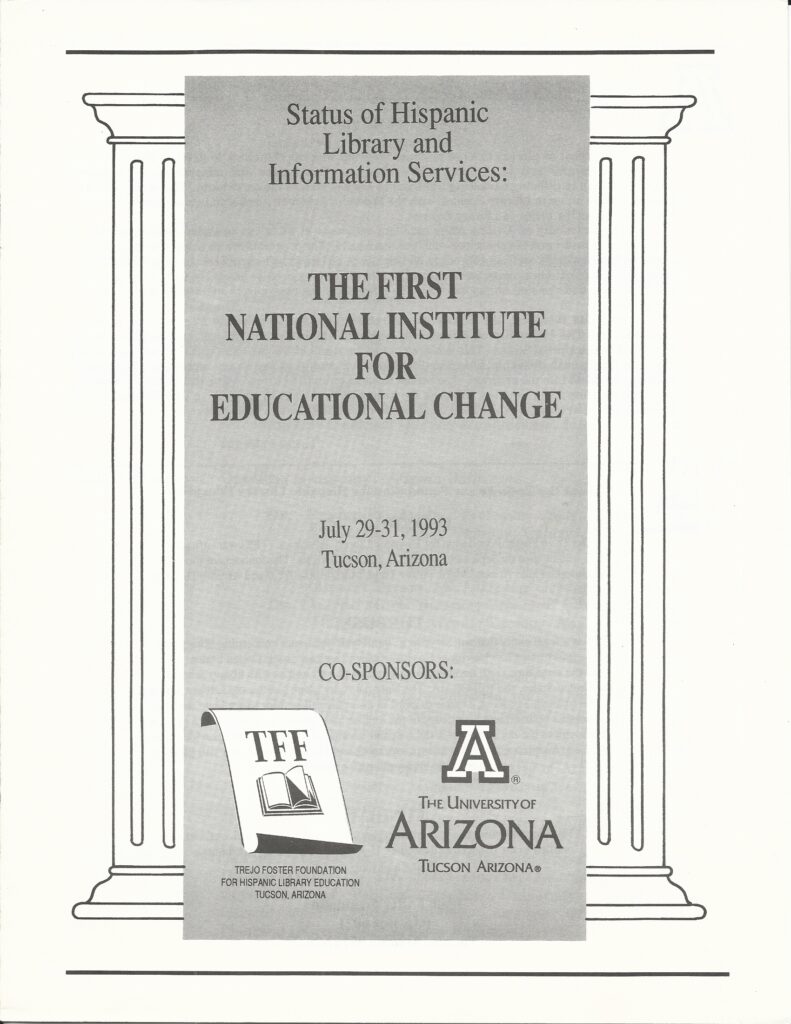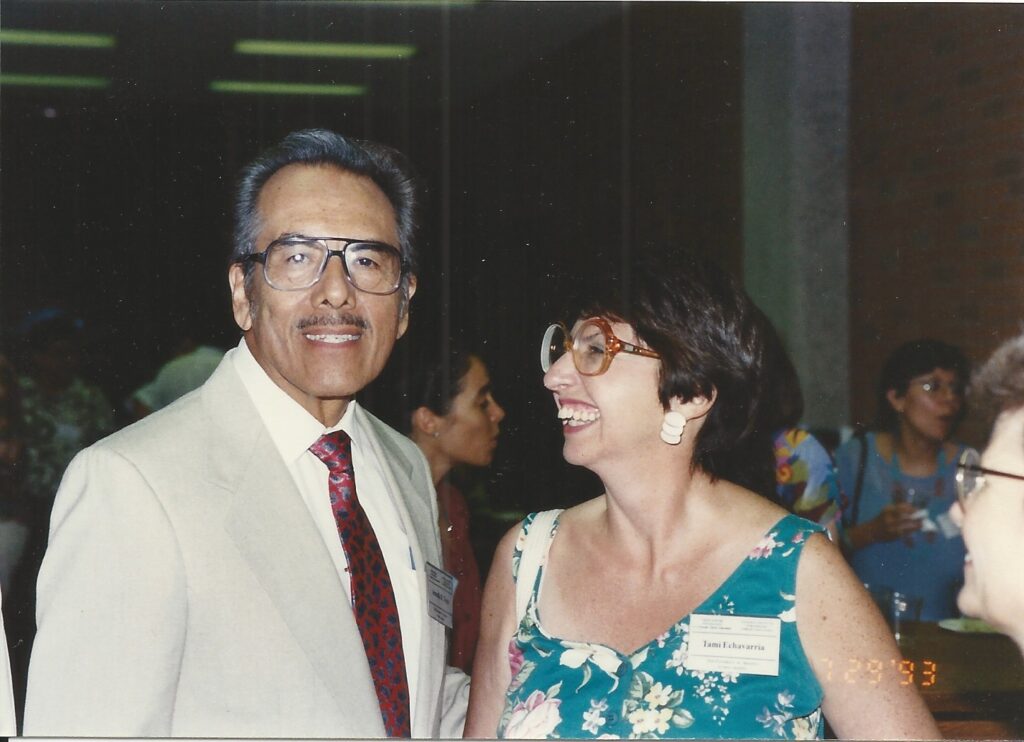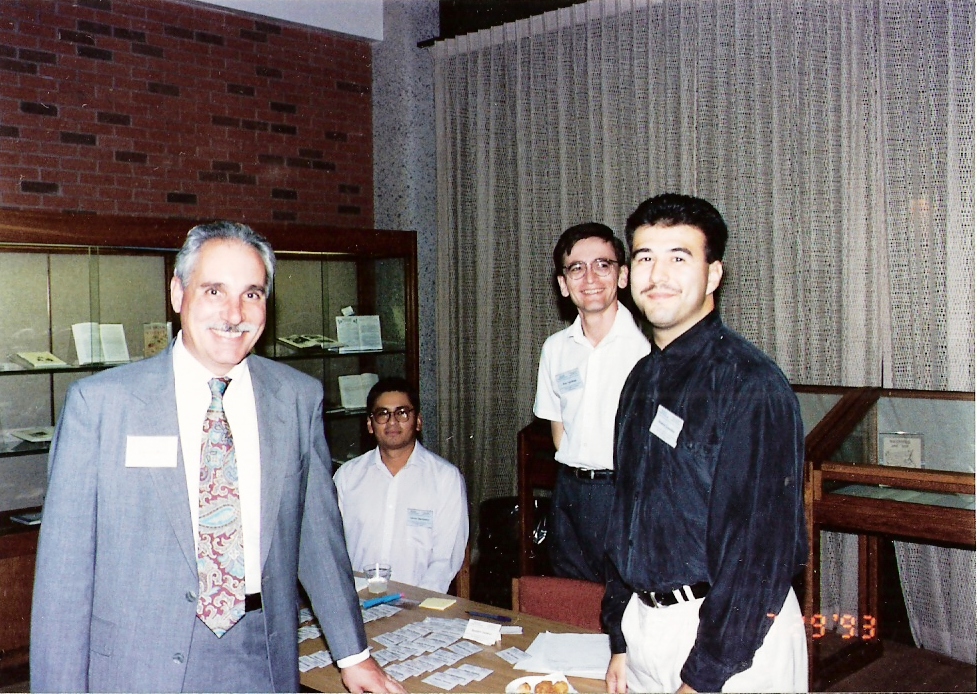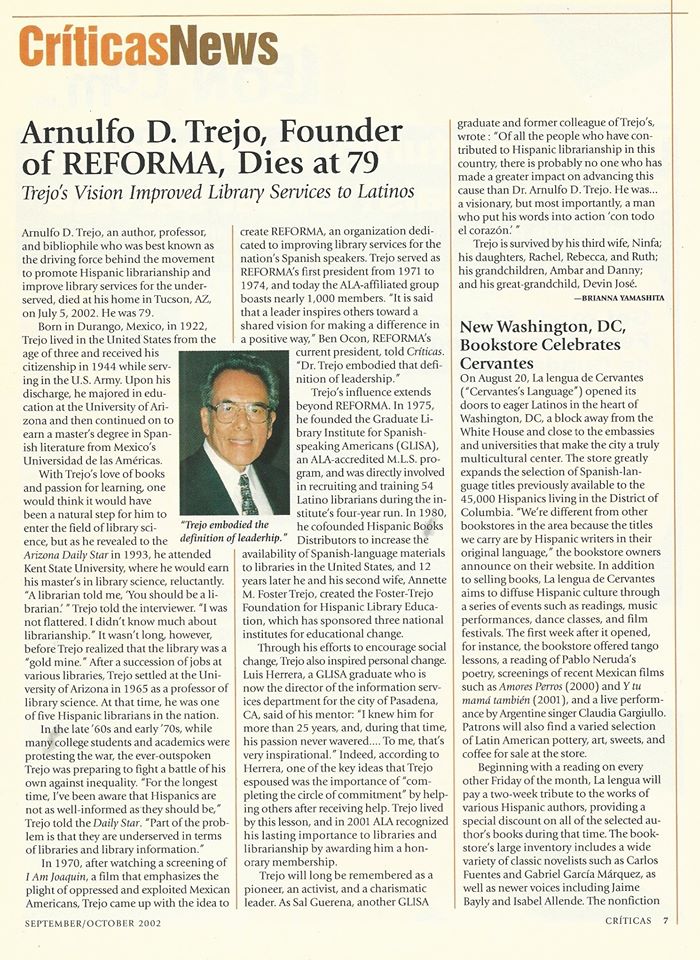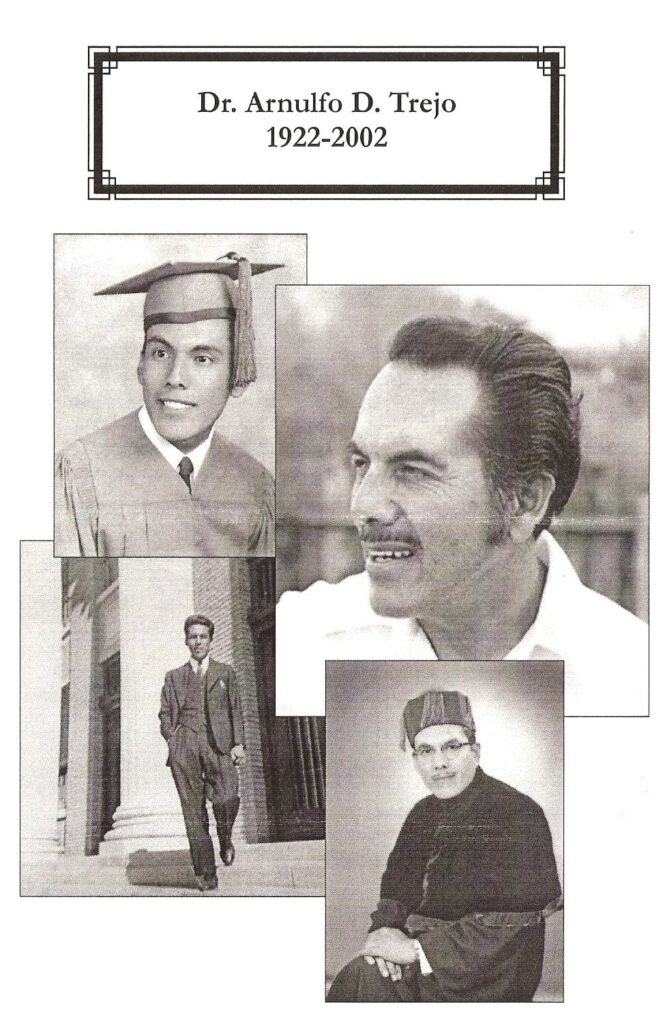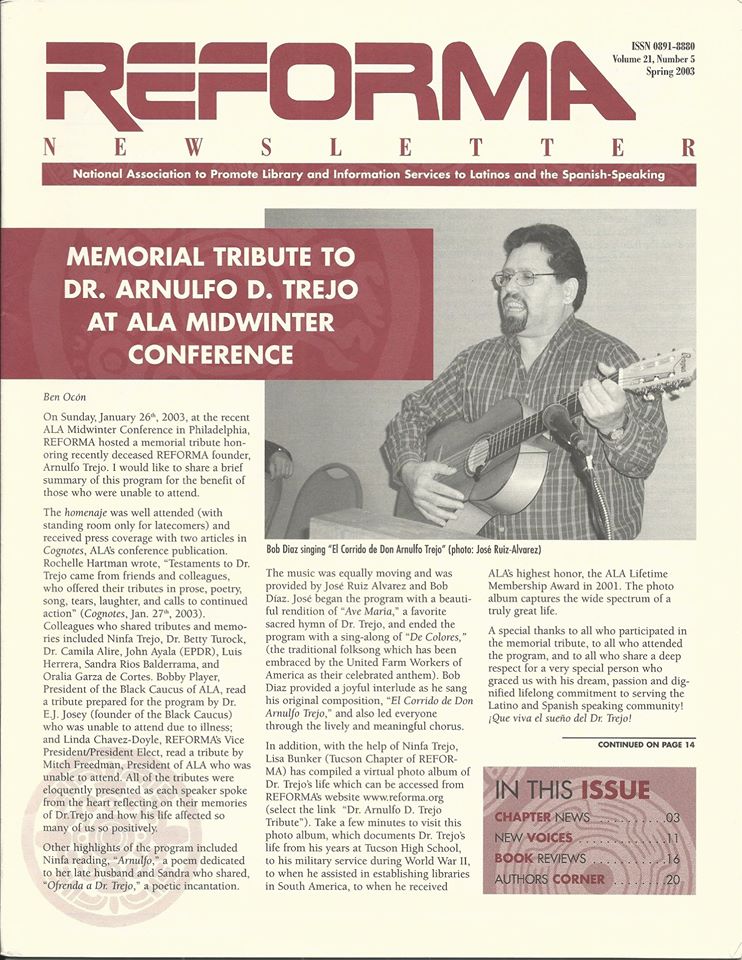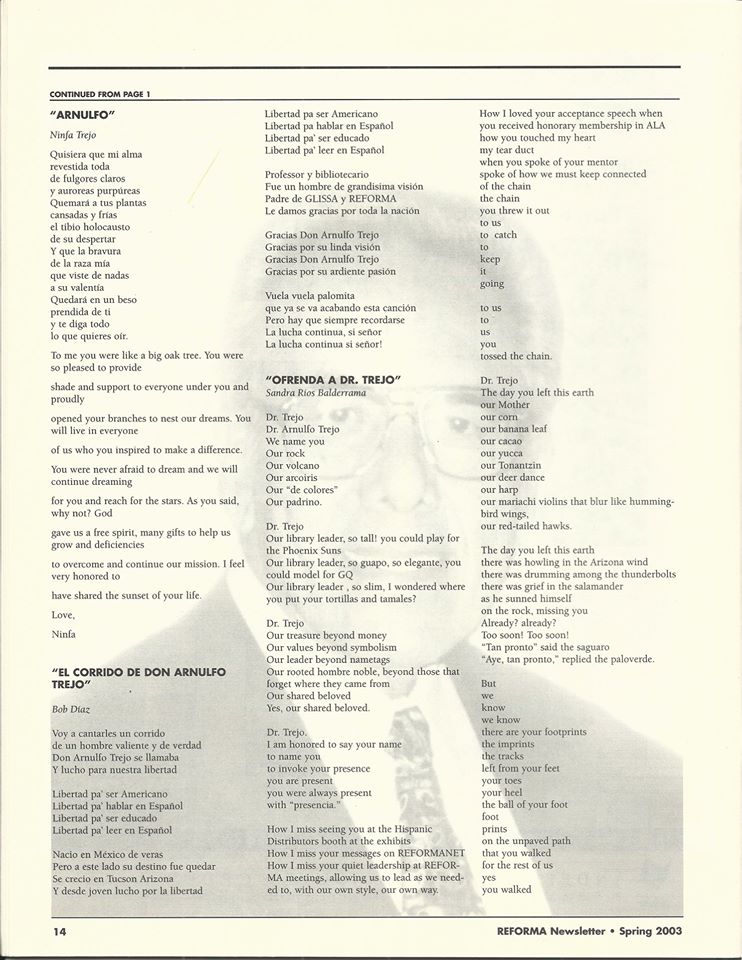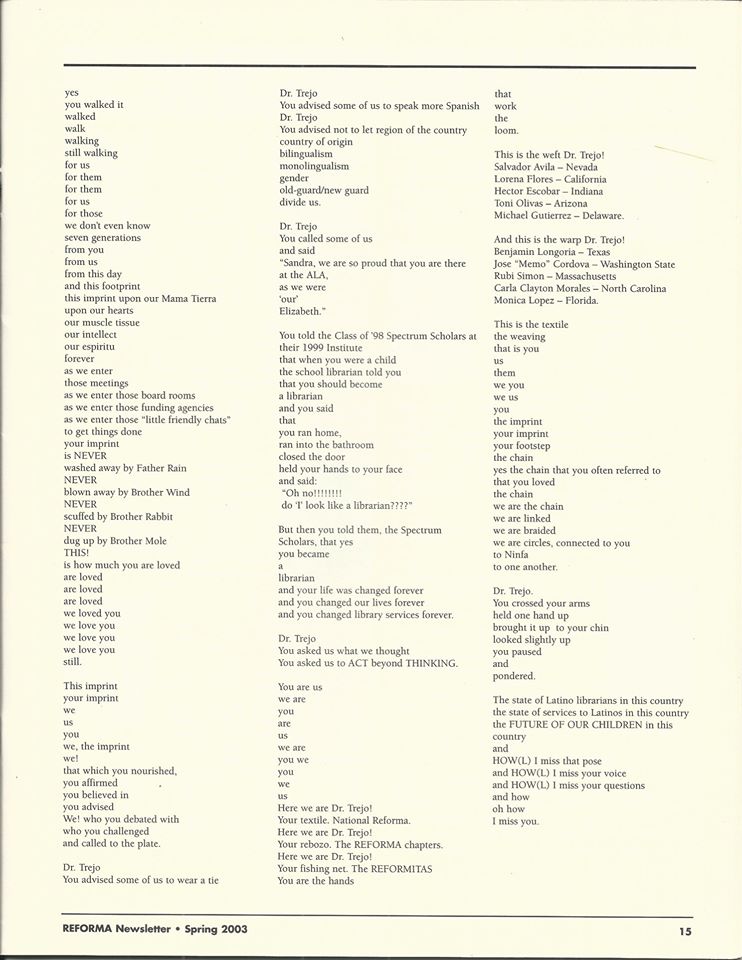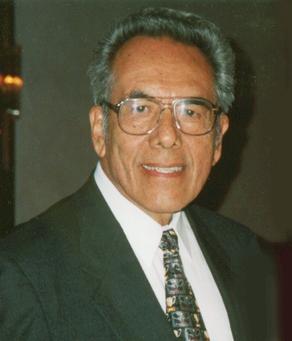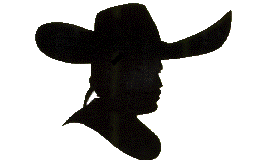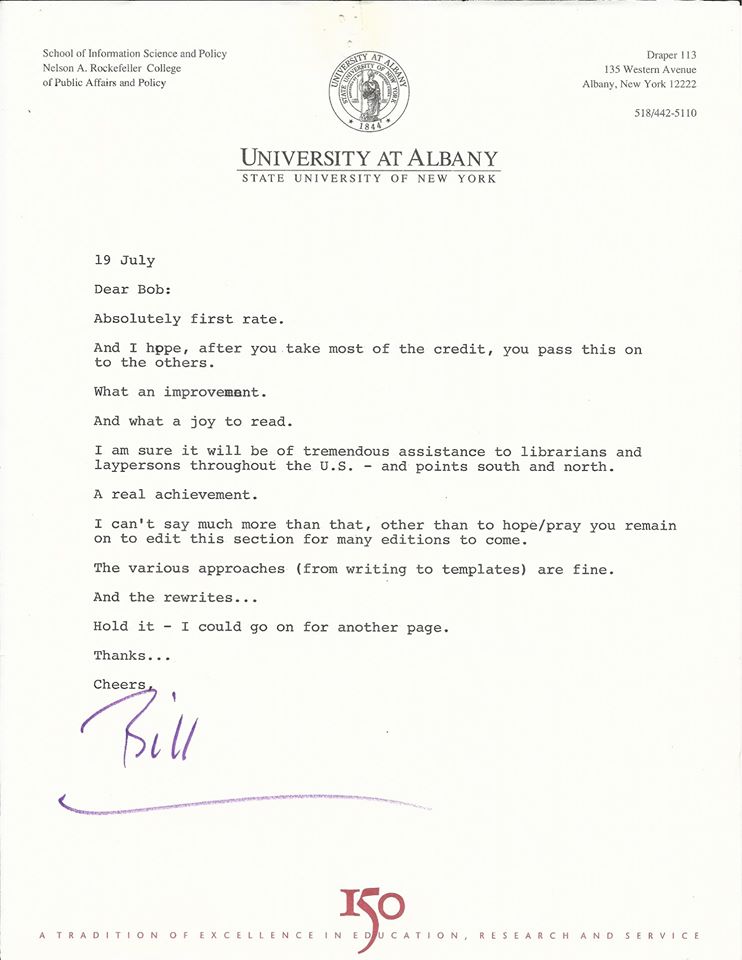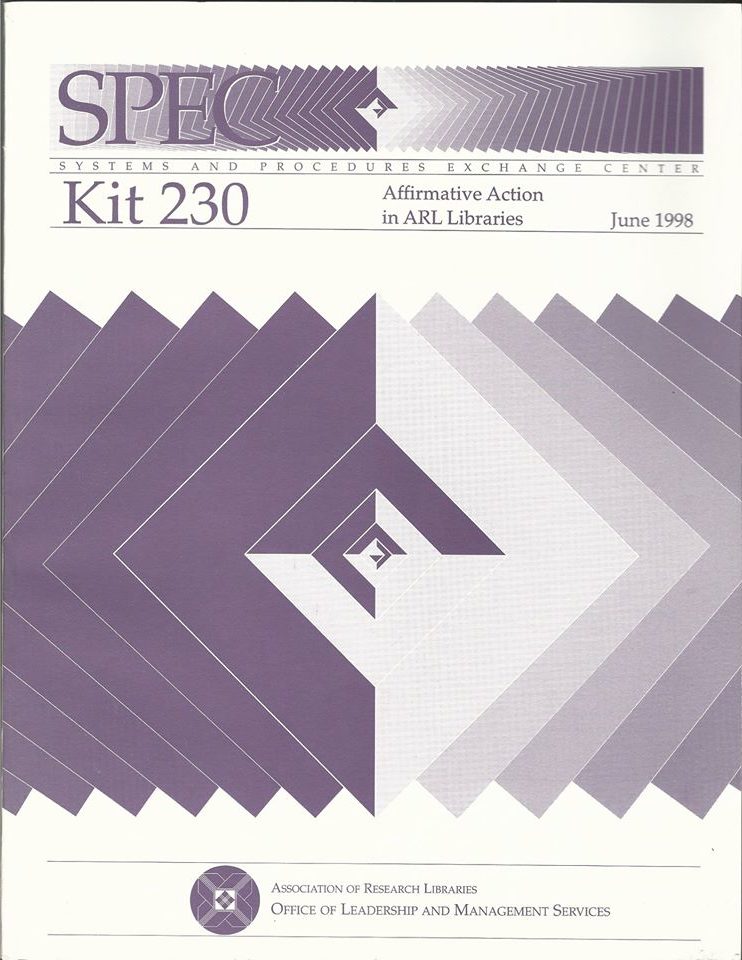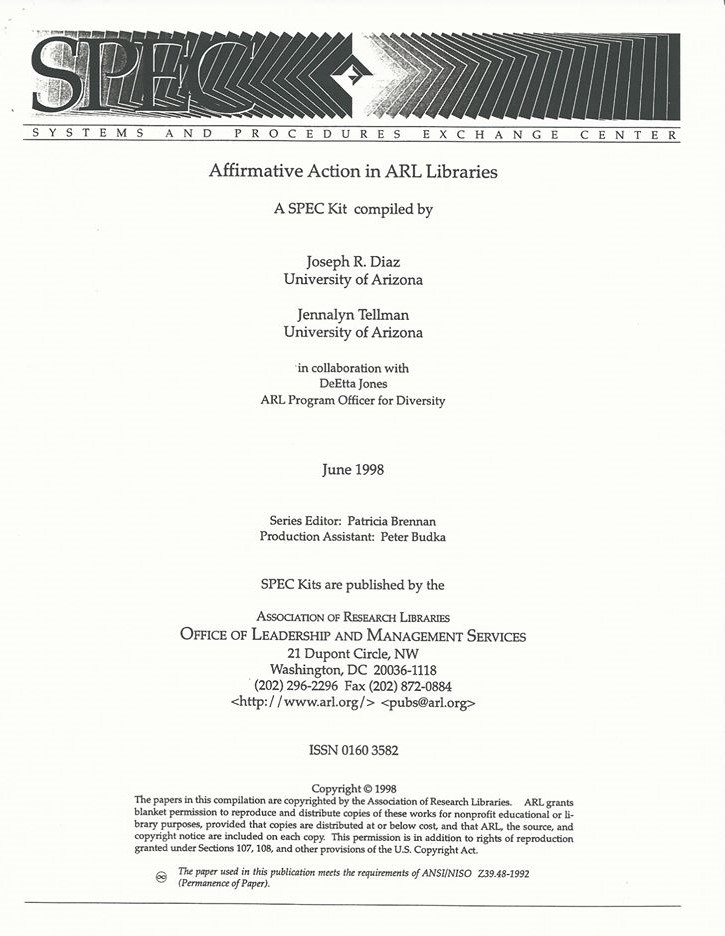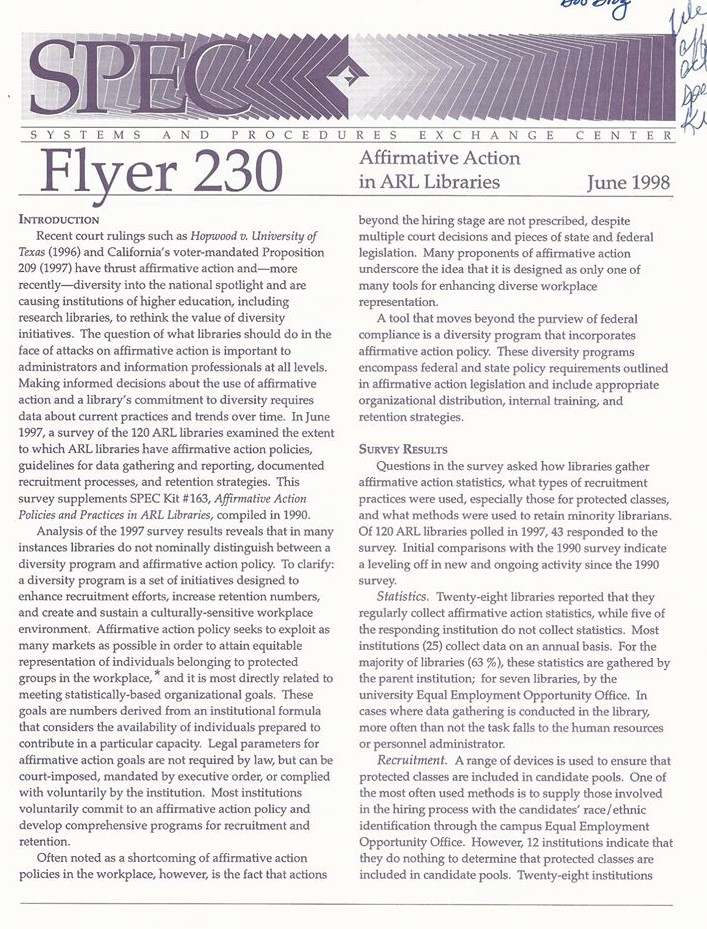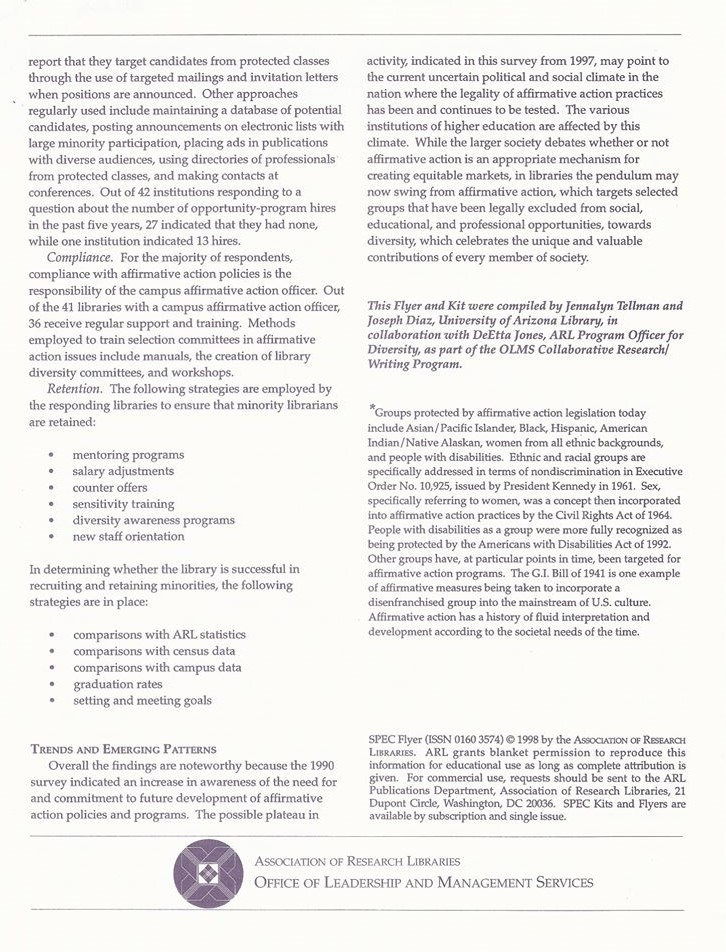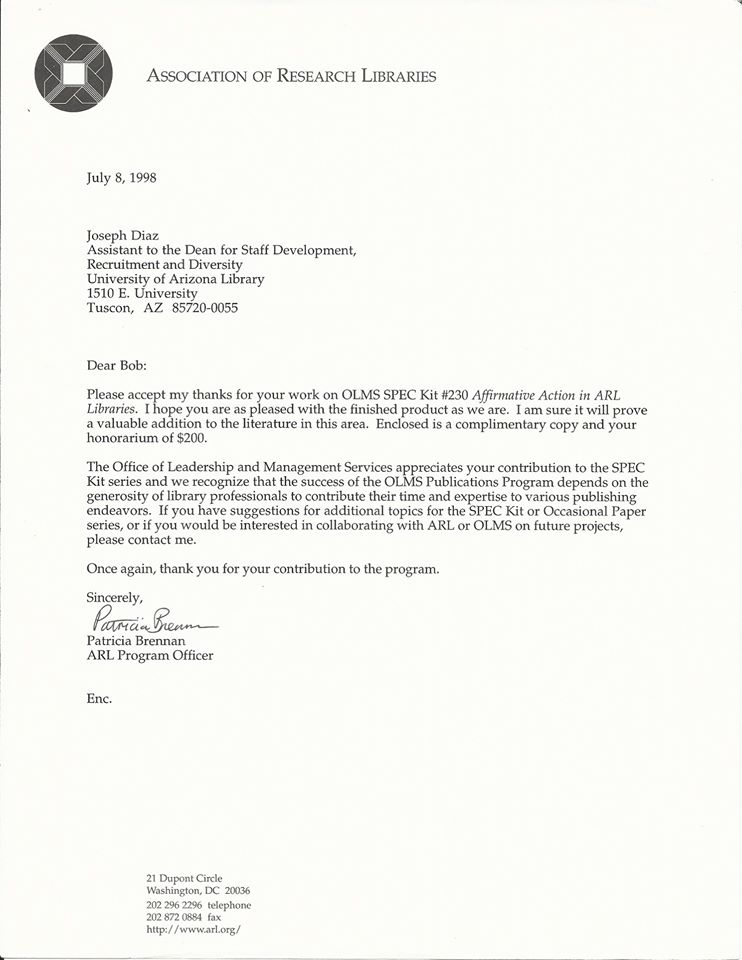Chronology of Education
1986: Masters of Library Science (MLS) Degree. The University of Arizona, Tucson, AZ.
1982: Bachelor of Arts degree in Psychology, with a minor in Sociology. The University of Arizona, Tucson, AZ.
Chronology of Employment
2011-present: Associate Librarian and Archivist, Special Collections, The University of Arizona Libraries.
Serve as curator for the performing arts and architecture collections. Work with donors to appraise and acquire new collections, physically process collections and manage other related activities, such as the creation of collections guides. Provide reference assistance, responding to customer queries in architecture, the performing arts and other areas. Participate in staffing the reading room. Conduct classroom instruction on the use of primary resources. Supervise student interns. Participate in library-wide committees. Since January 2020, coordinate the departments’ virtual reference service, permissions and copyright processes. From 2012 to 2018, managed the department’s exhibits and events programs.
2000-2011: Associate Librarian for the Performing Arts
Served as the Library faculty liaison to the departments of Music, Dance, Theater Arts, Africana Studies, Religious Studies and Media Arts. Engaged in collection development and management, reference service and instruction in all areas of the performing arts. Managed the National Flute Association Library. Worked with colleagues to coordinate database training and a lecture series for the campus community. Supervised student assistants and interns from the Graduate Library School. Served on library-wide committees.
1992-2000: Assistant to the Dean for Staff Development, Recruitment and Diversity
Reported directly to Dean of the Library. Coordinated staff development and diversity programming and training for the Library, while serving as a member of the Library’s administrative group and Library Cabinet. Managed the library’s training and professional development budget, allocating financial resources to the staff for a variety of activities. Served as liaison to several committees, such as the Affirmative Action Committee, the Diversity Council, and the Staff Development Advisory Board. Coordinated the Library’s recruitment efforts, and ensured that our recruitment pools were diverse whenever possible. Worked with other HR staff to provide training on team development, effective meetings, and new staff orientation. Supervised staff in the HR department. Promoted to Associate Librarian with continuing status in 1998.
1987-1992: Undergraduate Services Librarian, The University of Michigan Libraries.
Worked in the Undergraduate Library, providing reference service and instruction for the undergraduate community. Areas of instruction included English, Psychology and Political Science. Participated in building the library’s book collections, focusing on adding diverse titles in Chicano Studies and LGBTQ Studies to the library’s literature collections. Coordinated the reference assistants program. Duties included student supervision, coordination of the student’s desk schedules and provision of training to new students working on the reference desk. Served on the Library’s Diversity Committee and participated in diversity-related program planning and training. Was a member of the Residency Program, and founding member of the Gay and Lesbian Library Staff organization. Received a promotion to Associate Librarian in 1991.
1987: Public Services Librarian, The Nogales/Santa Cruz County Public Library.
Served as the lead reference and collection development librarian, with a primary focus on children’s programming. Conducted story hour sessions, visited schools, gave tours, and purchased materials for the collection. Collaborated with members of the local community to coordinate programming for the annual Very Special Arts Festival. Coordinated the Library’s Annual Booksale. Wrote a Library Services and Technology Act (LSTA) grant for a public programming series, which was funded. Represented the library in a number of media appearances on local television. Focused on promoting the Library’s programming and related activities.
1976-1986: Retail Clerk, Fry’s Food Stores.
Worked as a part-time as a carry out clerk, then as a stocker and cashier while in high school and college. Served as a union steward from 1983-1986.
Honors and Awards
2023: Tucson Top 20 award: Bob’s World(https://bobdiaz.net/) named one of Tucson’s top 20 local blog sites by Feedspot. See: https://blog.feedspot.com/tucson_blogs/?feedid=5494868&fbclid=IwAR1BoHoXGwl1tU7xMw5bNM3fJAXlH2ZO53MYIt1cu0iy7P3oP1-kWlSMWSM. This is my website, where I publish most of my writing, both professional and personal.
2002: Recipient, Movers and Shakers Award. This is an annual award given by Library Journal to leaders, activists and innovators in the field of librarianship. Recipients are nominated by their colleagues and selected by the editors of the journal. First cohort. https://bobdiaz.net/2021/09/28/bob-diaz-movers-shakers-2002/
Service/Outreach (limited to the past 10 years, approximately)
National/International
March, 2024: Delegate, representing Southern Arizona. ALA Voices For Libraries Day of Advocacy event.
2024: Chair, Harold T. Pinkett Student of Color Award Committee, Society for American Archivists.
October, 2023: Panelist/Reviewer. National Endowment for the Humanities grants in the performing arts.
September, 2023 – August, 2024: Senior Co-chair, Society of American Archivists (SAA), SAA Archives and Archivists of Color Section.
March, 2023: Delegate, representing southern Arizona. ALA Congressional Fly-In Day of Advocacy.
2023: Member, Pinkett Award Committee, Society for American Archivists.
2023: Member, Banks Award Committee, Society of American Archivists.
September 2022-August 2023: Junior Co-chair, Society of American Archivists (SAA) SAA Archives and Archivists of Color Section. Elected position.
2022-2023: Council member, Conference of Inter-Mountain Archivists (CIMA) Elected position.
2022-2023: Member, Conference of Intermountain Archivists Education committee. Committee assignments include reviewing scholarship applications for attendance at annual CIMA conference, and setting up educational webinars.
June, 2021-June 2024: Councilor At-Large, The American Library Association Council. Elected position.
2021-2023: Member, representing Tucson chapter, REFORMA National Board of Directors.
2021-2023: Member, Association of College and Research Library, Rare Books and Manuscripts Section, Diversity Committee.
2021-2022: Member, Society of American Music local arrangements committee for 2022 conference.
2020-2023: Member, REFORMA Education committee; served as interim chair in 2023.
2020-2021: Co-Chair, American Library Association Rainbow Roundtable Program Planning Committee.
2020: Guest reviewer, Hispanic Leadership Alliance Scholarship committee.
2015: Reviewer, ACRL Books for College Libraires.
2012-2015: Member At-Large, American Library Association Council. Elected position.
2012-2014: Member, REFORMA Board of Directors.
Local/State
Fall, 2022-Fall, 2024 Southern Arizona representative to the Arizona Library Association Executive Board. Re-elected.
2022-2024: Member, Arizona Library Association Membership, Marketing and Outreach Committee.
2022-2024: Member, Arizona Library Association Nominating Committee.
2022-2023: President, Tucson chapter of REFORMA. Re-elected.
2021-2022: President, Tucson chapter of REFORMA. Elected position.
Fall, 2020-Fall, 2022 Southern Arizona representative to the Arizona Library Association Executive Board. Elected position.
2020-2021: Member, Arizona Chapter of the American Institute of Architects.
2017-2019: Guest participant and contributor, the American Institute of Architects Arizona Chapter Archives Committee.
2015: Member, Arizona Library Association Conference Planning Committee.
2014-2016 Chair, Arizona Library Association Services to Diverse Populations Interest Group.
2014: Member, Arizona Library Association Marketing Committee.
2012-2015: Member, AZLA Board of Directors, southern region representative. Elected position.
2012-2014: President, REFORMA Tucson chapter. Elected for two consecutive terms.
Library Committees
2023: Chair, LFA Peer Review Committee.
2020-2021: Member, University of Arizona Library Faculty Assembly Awards Committee.
2020-2021: Liaison to the Executive Board of the UA Library Faculty Assembly. Elected position.
2016-2017: Member, University of Arizona Library Diversity Social Justice and Education Council.
2014: Member, University of Arizona Library, Library Faculty Assembly Sabbatical Review Committee.
2014: Member, University of Arizona Library, Library Faculty Assembly Bylaws and Standing Rules committee.
Other Committees/Activities (Internal or External)
2023: Member, search committee for the unit lead position in the Student Learning and Engagement unit at the University of Arizona Library.
2022-2023: Member, search committee for the unit lead for public services in Special Collections.
2020: Member, Future State Research Support and Partnerships Working Group, University of Arizona Libraries.
2012-2015: Member, Tucson Meet Yourself Board of Directors.
2004-2020: Program host, The Chicano Connection, KXCI Community Radio, Tucson.
Teaching (limited to the past 10 years, approximately)
Invited Teaching
Spring, 2024:
- PAH 420: Innovation and the Human Condition: Learning How to Improve Life in the Community and Beyond. Lecture/presentation–“A Look Back at Chicano Culture in Tucson in the 1970s”.
Fall 2023:
- JOUR 306 – Advanced Reporting. Introduction to the use of archives for primary research.2 sections. Lead instructor: Pate McMichael.
- PAH 420: Innovation and the Human Condition: Learning How to Improve Life in the Community and Beyond. Resources on local history. Primary instructor: Jacqueline Barrios. 1 hour.
Spring 2023:
- ARC 532, History of the Built Environment from 1350 to 1940. Introduction to classic works of architecture. Primary instructor: Natsumi Nonaka. 1 hour.
Fall 2022:
- Music 533, Music of the Twentieth Century, Using archives and special collections to find music-related primary sources. Primary Instructor: Matthew Mugmon, Hours Taught: 1
Spring 2022
- ARH 480/580, Art and the Environment in the US , A look at the work of Judith Chafee, American architect. Primary Instructor: Lee Ann Custer , Hours Taught: 1
Fall 2019
- Geog 375, Metropolitan Tucson, Finding primary sources for the study of local history. Primary Instructor: Taylor Miller, Hours Taught: 1
- GWS 240, Gender in a Transnational World , Introduction to the use of archives and primary resources. Primary Instructor: Domale Keys, Hours Taught: 1
- HIST 498, Capstone/Research Seminar, Using archives for historical research. Primary Instructor: Jadwiga Pieper Mooney, Hours Taught: 1
Fall 2018
- IRLS 560, Collection Management, Diversity issues in collection management. Primary Instructor: Stoffle, Hours Taught: 3
- HIST 375, Histories of Memories, Using archival resources for historical research. Primary Instructor: Susan Crane, Hours Taught: 2
- CATS Athletics minority student leadership group, N/a, A Look at the 1968 in America exhibit, Primary Instructor: Sophia Read, Hours Taught: 2
Spring 2018
- IRLS 560, Collection Management, Diversity and collection development. Primary Instructor: Stoffle, Hours Taught: 3
Fall 2017
- LIS 567, Leadership in Libraries , Leadership in archives and special collections. Primary Instructor: Carla Stoffle , Hours Taught: 3
- High School students from Nogales High School , N/A, An introduction to primary sources housed at the UA Libraries. Primary Instructor: Luke Brannen, Hours Taught: 2
- History 495G, Natural Resources and the Law in the Spanish and Mexican Borderlands, Finding historical materials on the borderlands in Special Collections. Primary Instructor: Michael Brescia, Hours Taught: 2
Summer 2017
- WSIP Summer Camp, An overview of Special Collections and archives for beginnning researchers , Primary Instructor: Andrea Hernandez Holm, Hours Taught: 2
- Anthro 150, Many Ways of Being Human, An introduction to primary source research and the use of archives. Primary Instructor: Dana Drake Rosenstein, Hours Taught: 4
Spring 2017
- Honors course, Picturing Arizona, Finding primary research materials on Arizona and an introduction to archives. Primary Instructor: McStott, Jennifer, Hours Taught: 2
- JH 487, American Press History, Using primary sources in archives and special collections for research. Primary Instructor: Lumsden, Johanna, Hours Taught: 2
- HIST 301, Introduction to the Study of History, Using primary sources for historical research. Primary Instructor: Irwin, Hours Taught: 4
Fall 2016
- IRLS 560, Collection Management , Collection Development and Diversity. Building diverse collections. Primary Instructor: Carla Stoffle, Hours Taught: 3
- IRLS 557, Documenting Diverse Cultures and Communities , Community engagement and Libraries. Primary Instructor: Richard Chabran
- MFA Generative Dramaturgy class, Generative Dramaturgy, Finding primary resources in theater arts. Primary Instructor: Jessica Maerz, Hours Taught: 2
- HIST 301, Introduction to the Study of History, Using primary sources and archives for historical research. Primary Instructor: Irwin, Hours Taught: 3
Spring 2016
- IRLS 560, Collection Management , Collection development and diversity. Primary Instructor: Carla Stoffle , Hours Taught: 3
Fall 2015
- MAS 265, Overview of Mexican American Studies , An overview of Mexican American music history in Tucson. Primary Instructor: Dr. Lydia Otero , Hours Taught: 1
Fall 2014
- UA, IRLS 557, Documenting Diverse Cultures , Community outreach and engagement and libraries. Primary Instructor: Janet Ceja , Hours Taught: 1
- UA, Theatre Arts, Theatre of the Americas , Finding primary performing arts resources in archives and Special Collections. Primary Instructor: Kevin Byrne, Hours Taught: 3
Spring 2014
- UA, CESL Conversation class for French students, Conversation, An introduction to archives and Special Collections. Primary Instructor: Holly Wehmeyer, Hours Taught: 1
- Apollo Middle School, Science class, n/a, Science class, An introduction to Special Collections and archives. Primary Instructor: Steve Olguin, Hours Taught: 1
Fall 2012
- MAS 265, Overview of Mexican American Studies, A historical overview of Mexican American music in Tucson. Primary Instructor: Lydia Otero, Hours Taught: 1
Student Mentoring and Advising Activities
- Summer, 2022: Bianca Finley Alper, Intern. Provided supervision and mentorship.
- January-May, 2023: Bianca Finley Alper. Student worker. Provided supervision and mentorship.
- Fall, 2015-Spring, 2016: Jessica Redhouse. Participated in mentoring program sponsored by ARL Mosaic program.
- Fall, 2015: Guest lecture to students on leadership in Blue Chip Leadership program.
- Spring 2014-Spring 2019: supervised student assistants in Special Collections who helped with exhibits and events.
Publications/Creative Activity (no time limit)
Refereed Journal Articles
1999: “Helping Teams Work: Lessons Learned from the University of Arizona Library Reorganization”, article co-authored with Chestalene Pintozzi, Library Administration and Management, Vol. 13, No. 1, Winter 1999. https://bobdiaz.net/wp-content/uploads/2020/02/Helping-Teams-Work-Lessons-Learned-.pdf
Books, Chapters, Monographs
2013:
- “Protest Music in the Latino Community,” book chapter in The Encyclopedia of Latino Culture: From Calaveras to Quinceaneras”, edited by Charles M. Tatum, Greenwood Press, 2013. https://bobdiaz.net/wp-content/uploads/2020/02/Protest-Music-in-the-Latino-Community-2.pdf
2005:
- “The Intersection of Race and Queer Sexuality,” book chapter in Multiracial America: A Resource Guide on the History and Literature of Interracial Issues, edited by Karen Downing, Darlene Nichols and Kelly Webster. Scarecrow Press, 2005. https://bobdiaz.net/wp-content/uploads/2020/02/The-Intersection-of-Race-and-Queer-Sexuality-chapter.pdf
2003:
- Library Faculty Millennium Project Oversight Committee Final Report. publication, The University of Arizona Libraries, September 9, 2003. My contribution: 25%. Co-authored with Patricia Promis, Doug Jones, and Bonnie Travers.
2002:
- “Latin America”, book chapter in Magazines for Libraries 11th edition. New Providence, New Jersey: R.R. Bowker, 2002. Coordinator and primary contributor to a completely revised chapter with new co-authors Olivia Olivares and Veronica Reyes. My contribution: 45%.
- “Latinos” book chapter in Magazines for Libraries 11th edition. New Providence, New Jersey: R.R. Bowker, 2002. Coordinator and primary contributor to a completely new chapter with new co-authors Olivia Olivares and Veronica Reyes.
1998:
- SPEC Kit 230: Affirmative Action in ARL Libraries, Washington DC, The Association of Research Libraries, 1998. Co-authored with Jennalyn Tellman and DeEtta Jones. https://bobdiaz.net/2020/03/07/spec-kit-230-affirmative-action-in-arl-libraries-publication-1998/
- “The Evolution of the Roles of Staff and Team Development in a Changing Organization: The University of Arizona Library Experience,” published in the book, Finding Common Ground: Creating the Library of the Future Without Diminishing the Library of the Past, edited by Cheryl LaGuardia and Barbara a Mitchell, Neal-Schuman Publishers, 1998. https://bobdiaz.net/wp-content/uploads/2020/02/The-Evolution-of-the-Roles-of-Staff-and-Team-Development.pdf
1997:
- “Latin America and Latinos”, two chapters in Magazines For Libraries, 9th edition. New Providence, New Jersey, R.R. Bowker, Coordinator of and contributor to completely revised chapter, with additional contributions from Patricia Promis, Thomas Marshall, and Theresa Salazar.
1995:
- “Latin America” chapter in Magazines for Libraries, 8th edition. New Providence, New Jersey, 1995. Lead author and chapter coordinator, with contributions from Patricia Promis, Tom Marshall, Theresa Salazar and Susan Husband. https://bobdiaz.net/wp-content/uploads/2020/03/Magazines-for-Libraries-1998.pdf
1994:
- “Collection Development in Multicultural Studies”, book chapter in Cultural Diversity in Libraries, edited by Don Riggs and Patricia Tarin, Neal-Schuman Publishers, 1994. https://bobdiaz.net/wp-content/uploads/2020/02/Collection-Development-in-Multicultural-Studies-.pdf
1993:
- “Instruction in a Multicultural/Multiracial Environment”, chapter co-authored with Karen Downing, in the book, Learning to Teach: Workshops on Instruction. American Library Association, 1993. https://bobdiaz.net/wp-content/uploads/2020/02/Instuction-in-a-Multicultural-Multiracial-Environment-.pdf
Other Publications
2023:
- “An overview of the history of Tucson and Southern Arizona”, article that appeared in a zine produced by Jacqueline Barrios’ PAH 420 class. 100% responsibility.
2020:
- “Update on the Fine Arts Library at the University of Arizona“ / Publication, October, 2020. Article in the Mountain Plains Chapter of the Music Library Association’s newsletter, Conventional Title, Opus 76, October 2020. https://bobdiaz.net/wp-content/uploads/2020/10/Article-for-Conventional-Title-newsletter.pdf
2009:
- “Confessions of a Ranchera Junkie”, The REFORMA Newsletter, Summer 2009. https://bobdiaz.net/wp-content/uploads/2020/02/REFORMA-article-by-Bob-Diaz-2.pdf
2008:
- “Musings of a Gay Veterano REFORMISTA Librarian: The Search for GLBT Liberation in Library Land”, 2008, The REFORMA National Newsletter, Spring/Summer, 2008. https://bobdiaz.net/wp-content/uploads/2020/02/RDFORMA-Newsletter-article-version-2-j.pdf
2004:
- “Student Brings Strong Customer Service Orientation to National Flute Association Library” / Publication, March 2004. Publication, March, 2004 Flutist Quarterly Magazine.
Blog posts
2023:
- Diaz, J.R. (2023). Tina Turner remembered. https://bobdiaz.net/2023/06/05/remembering-tina-turner/
- Diaz, J.R. (2023) Genealogical Resources available in Special Collections at the University of Arizona. https://bobdiaz.net/2023/05/09/instruction-session-for-pima-county-genealogical-society-may-10-2023/
2022:
- Diaz, J. R. (2022). Dr. Arnulfo Trejo: A Look At His Life and Work. https://bobdiaz.net/2022/12/01/dr-arnulfo-trejo-a-look-at-his-life-and-work/
- Diaz, J. R. (2022). Benny Goodman (May 30, 1909-June 13, 1986). https://bobdiaz.net/2022/10/08/benny-goodman/
- Diaz, J. R. (2022). 2022 AZLA Conference, Prescott, Az. https://bobdiaz.net/2022/11/07/2022-azla-conference-prescott-az/
- Diaz, J. R. (2022). The 2005 Border Book Festival. https://bobdiaz.net/2022/10/24/the-2005-border-book-festival-in-la-mesilla-new-mexico/
- Diaz, J. R. (2022). Cine Plaza at the Fox. https://bobdiaz.net/2022/10/01/cine-plaza-at-the-fox/
- Diaz, J. R. (2022). Old Main Renovation, 2014. https://bobdiaz.net/2022/08/12/old-main-renovation-2014/
- Diaz, J. R. (2022). UA Alumni Association 50 Year Reunion Exhibition. https://bobdiaz.net/2022/08/12/ua-alumni-association-50-year-reunion-exhibit/
- Diaz, J. R. (2022). The Chicano Connection and KXCI Radio. https://bobdiaz.net/2022/08/13/the-chicano-connection-and-kxci-radio/
2021
- Diaz, J.R. (2021) Status of Library and Information Services: A National Institute for Educational Change. https://bobdiaz.net/2021/10/27/status-of-hispanic-library-and-information-services-a-national-institute-for-educational-change-july-29-31-1993/
- Diaz, J.R. (2021). Reference Services in Special Collections at the University of Arizona Library. https://bobdiaz.net/2021/10/11/reference-services-in-special-collections/
2020
- Diaz, J.R. (2020). Remembering Dr. Arnulfo Trejo, 1920-2002. Remembering Dr. Arnulfo D. Trejo 1922-2002. | Bob’s World (bobdiaz.net)
Exhibitions
2018:
- Diaz, J. R. (2018). 1968 In America (exhibition and programs). Special Collections gallery. Tucson, Az: The University of Arizona Libraries. https://bobdiaz.net/2020/02/24/1968-in-america-exhibit-and-programs/
- Diaz, J. R. (2018). Judith Chafee: Iconoclast (exhibition and programs). The University of Arizona Libraries, Special Collections gallery. Tucson, Az.: The University of Arizona Libraries. https://bobdiaz.net/2020/02/24/judith-chafee-iconoclast-exhibit-and-programs-2018/
2017:
- Diaz, J. R. (2017). Visions of the Borderlands: Myths and Realities (exhibition and program). Special Collections gallery. Tucson, Az.: The University of Arizona Libraries. https://bobdiaz.net/2020/03/01/visions-of-the-borderlands-myths-and-realities-exhibition-and-events-2017/
2016:
- Diaz, J. R. (2016). The Life and Legacy of the USS Arizona (exhibition). Special Collections gallery. Tucson, Az.: The University of Arizona Libraries. https://bobdiaz.net/2020/03/03/the-life-and-legacy-of-the-u-s-s-arizona-exhibition-2016/
- Diaz, J. R. (2016). The Performing Arts In Tucson (exhibition). Main Library. Tucson, Az.: The University of Arizona Libraries. https://bobdiaz.net/2020/03/04/the-performing-arts-in-tucson-exhibition-2015/
2015:
- Diaz, J. R. (2015). Tucson: Growth, Change, Memories (exhibition and programs). Special Collections exhibition gallery. Tucson, Az.: The University of Arizona Libraries
- Diaz, J. R. (2015). A.E. Douglass and The Tree Ring Lab (exhibition). Science-Engineering Library. Tucson, Az.: The University of Arizona Libraries. http://speccoll.library.arizona.edu/exhibits/ae-douglass-and-tree-ring-lab
- Diaz, J. R. (2015). Celebrating Excellence: Women in Anthropology (exhibition and program). Main Library. Tucson, Az.: The University of Arizona Libraries. https://bobdiaz.net/2020/03/08/celebrating-excellence-women-in-anthrpology-exhibition-main-library-and-program/
- Diaz, J. R. (2015). Celebrating Excellence: 100 Years of Anthropology at the University of Arizona (exhibition and program). Special Collections exhibition gallery. Tucson, Az.: The University of Arizona Libraries. https://bobdiaz.net/2020/03/08/100-years-of-anthropology-at-the-university-of-arizona-exhibition-2015/
2014:
- Diaz, J. R. (2014). The Wilderness Act: 50th Anniversary (exhibition and program). Special Collections. Tucson, Az.: The University of Arizona Libraries. https://bobdiaz.net/2020/03/05/the-wilderness-act-arizonans-keeping-it-wild-for-50-years-exhibition-and-program-2014/
- Diaz, J. R. (2014). Mars Madness: Sci Fi, Popular Culture, and Ray Bradbury’s Literary Journey to Outer Space (exhibition and programs). Special Collections exhibition gallery. Tucson, Az.: The University of Arizona Libraries. https://bobdiaz.net/2020/03/04/mars-madness-sci-fi-popular-culture-and-ray-bradburys-literary-journey-to-outer-space-exhibition-2014/
2013:
- Diaz, J. R. (2013). 40 Years of Tucson Meet Yourself (exhibition and programs). Special Collections exhibition gallery. Tucson, Az.: The University of Arizona Libraries. https://bobdiaz.net/2020/03/02/40-years-of-tucson-meet-yourself-exhibition-and-programs-2013/
- Diaz, J. R. (2013). 50 Years: Civil Rights in Arizona (exhibition and programs.). Special Collections exhibition gallery. Tucson, Az.: The University of Arizona Libraries. https://bobdiaz.net/2020/03/01/50-years-civil-rights-in-arizona-exhibition-and-programs-2013/
- Diaz, J. R. (2013). Teatro Libertad and Chicano Theatre in Tucson (exhibition and program). University of Arizona Main Library. Tucson, Az.: The University of Arizona Libraries. https://bobdiaz.net/2020/03/02/teatro-libertad-and-chicano-theater-in-tucson-exhibition-and-program-2013/
2012:
- Diaz, J. R. (2012, October). Lowriders exhibition. Tucson Meet Yourself. Tucson, Az.: Tucson Meet Yourself. https://bobdiaz.net/2020/03/06/lowrider-display-at-tucson-meet-yourself-exhibition2012/
- Diaz, J. R. (2012, June 19). A Look at Tucson’s Cultural and Architectural Treasures (exhibition and program). University of Arizona Main Library. Tucson, Az: The University of Arizona Libraries. https://bobdiaz.net/2020/02/25/a-look-at-tucsons-cultural-architectural-treasures-exhibition-and-program-2012/
- Diaz, J. R. (2012, January 6). Company Town: Arizona’s Mining Communities During 100 Years of Statehood (exhibition and program). University of Arizona Science Engineering Library. Tucson, Az.: The University of Arizona Libraries. https://bobdiaz.net/2020/02/23/2012-company-town-exhibit/
- Diaz, J. R. (2012, April 2). Arte Público Press and the Legacy of Latino Publishing in the U.S., (exhibition and program). University of Arizona Main Library. Tucson, Az.: The University of Arizona Libraries. https://bobdiaz.net/2020/03/01/arte-publico-press-and-the-legacy-of-latino-publishing-in-the-u-s-exhibit-and-lecture-2012/
- Diaz, J. R. (2012). Medicine and Medical Facilities in Early Tucson. (exhibition). Science-Engineering LIbrary. https://bobdiaz.net/2020/02/28/a-look-at-medicine-medical-facilities-in-early-tucson-exhibition-2012/
2010:
- Diaz, J. R., & Escudero, V. R. (2010, August 31). Stories and Music of the Mexican Revolution (exhibition and programs). Special Collections exhibition gallery. Tucson, Az.: The University of Arizona Libraries. https://bobdiaz.net/2021/07/24/stories-and-music-of-the-revolution-exhibition-september-9-december-20-2010/
Conferences/Scholarly Presentations
2023
- Diaz, J.R. (2023). Coordinator, “Leadership in Archives and Special Collections from a BIPOC Perspective” panel presentation given at the annual RBMS Conference, Summer, 2023. (I wrote and submitted the proposal for this event as a member of the RBMS Diversity Committee and coordinated it, but was not part of the panel).
- Diaz, J.R. (2023) “An Introduction to Artists’ Archives”, Society of American Archivists Students and New Archives Professionals Section panel presentation, program panelist, April 11, 2023. https://connect.archivists.org/discussion/snapvms-webinar-an-introduction-to-artists-archives-1
2022
- Diaz, J. R. (2022, December). Dr. Arnulfo Trejo: A Look At His Life And Work. VII Encuentro Internacional Sobre Comunicacion, Frontera y Movimientos Emergentes. Tucson, Az.: Universidad de Sonora, University of Arizona Confluence Center for Creative Inquiry, UA Mexican American Studies Dept. et al. https://bobdiaz.net/2022/12/01/dr-arnulfo-trejo-a-look-at-his-life-and-work/
2021
- Diaz, J.R. (2021) Coordinator, “What’s in a name?: LGBTQ+ and Latinx perspectives on access terminology–challenges and solutions“ panel presentation, American Library Association Annual Meeting. A panel program that I coordinated that featured Emily Drabinsky, Andrea Guzman and Jamie Lee. https://bobdiaz.net/2021/07/18/whats-in-a-name-lgbtq-and-latinx-perspectives-on-access-terminology-challenges-and-solutions/
2020
- Diaz, J. R. (2020, February). Architectural Collections at the University of Arizona Libraries. Arizona Archives Summit XII. Phoenix, Az.: Arizona Archives Alliance. https://bobdiaz.net/conference-presentations/architectural-collections-at-the-university-of-arizona-libraries/
2016
- Diaz, J. R. (2016, November). Collection Development and Diversity. The Arizona Library Association Annual Conference. Tucson, Az.: The Arizona Library Association. https://bobdiaz.net/wp-content/uploads/2020/02/Diversity-and-Collection-Development-2-presentation.pdf
- Diaz, J. R. (2016, October). What’s To Know About Corridos Anyway? Una Noche de Corridos. Tucson, Az.: The University of Arizona Libraries Special Collections. https://bobdiaz.net/2016/10/04/whats-to-know-about-corridos-anyway/
2013
- Diaz, J. R., & Reyes-Escudero, V. (2013, June). The Performance of Archives: Challenges & Opportunities. 54th Annual RBMS Preconference, O Rare! Performance in Special Collections. Minneapolis, Minn.: ALA/ACRL/RBMS. https://bobdiaz.net/wp-content/uploads/2020/02/The-Performance-of-Archives.pdf
2012
- Diaz, J. R. (2012, April). “The Life and Legacy of Cipriano Ortega: Ferocious Mexican Outlaw or Entrepreneurial Genius?” Arizona Centennial Conference. Arizona Historical Foundation. https://bobdiaz.net/wp-content/uploads/2020/02/Cipriano-Ortega-paper-03-09-12.pdf
Awarded Grants / Contracts
2022:
- Received a $3,000 grant from the Arizona State Library to coordinate events for the Tucson Chapter of REFORMA’s El Dia Del Nino/Dia Del Libro annual event.
- Received a grant for $2,500 from the American Society of Architectects Arizona chapter to hire a student assistant to help process architectural collections.
2021
- Received a $2,000 grant from the Arizona State Library to coordinate events for the Tucson Chapter of REFORMA’s El Dia Del Nino/Dia Del Libro annual event.
